

A camera that takes one trillion frames per second. Benjamin Bratton: What's Wrong with TED Talks? at TEDxSanDiego 2013 - Re:Think. Alberto Cairo: There are no scraps of men. Sheryl WuDunn: Our century's greatest injustice. TED: Ideas worth spreading. Don Tapscott: Four principles for the open world. Why bees are disappearing: Marla Spivak at TEDGlobal 2013. Photo: James Duncan Davidson Our supermarket produce aisles would look very, very bare without bees.
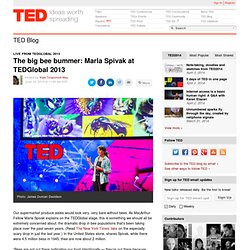
As MacArthur Fellow Marla Spivak explains on the TEDGlobal stage, this is something we should all be extremely concerned about: the dramatic drop in bee populations that’s been taking place over the past seven years. (Read The New York Times’ take on the especially scary drop in just the last year.) In the United States alone, shares Spivak, while there were 4.5 million bess in 1945, thee are now about 2 million. “Bees are not out there pollinating our food intentionally — they’re out there because they need to eat,” says Spivak.
There are 20,000 species of bees. Another popular bee is the honeybee, which Spivak calls the “charismatic representative” for the other bee species. Bees have survived for over 50 million years. “This small bee is holding up a large mirror — how much is it going to take to contaminate humans?” But there is a solution, says Spivak. TED aligns with Monsanto, halting any talks about GMOs, 'food as medicine' or natural healing. (NaturalNews) Allow me to be the first to announce that TED is dead.

Why? Because the group that organizes so-called "TED talks" has been thoroughly hijacked by corporate junk science and now openly rejects any talks about GMOs, food as medicine, or even the subject of how food can help prevent behavioral disorders in children. All these areas of discussion are now red-flagged from being presented on any TED stage. This is openly admitted by TEDx itself in a little-known letter publicly published on December 7, 2012. Click here to view the letter. In that letter, TED says that people who talk about GMOs are engaged in "pseudoscience. " The letter also advises TEDx organizers to, "reject bad science, pseudoscience and health hoaxes," meaning anyone who talks about GMOs, "food as medicine" or similar topics. The TED organization, incredibly, believes that food cannot be medicine and does not contain medicine.
Read the letter yourself. That statement is blatantly false. Have TED Talks Turned Ideas into an Industry? AMERICAN CHRONICLES about the TED ideas conference.
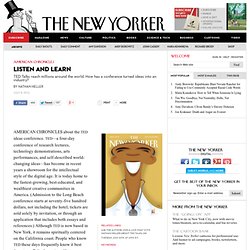
TED—a four-day conference of research lectures, technology demonstrations, arts performances, and self-described world-changing ideas—has become in recent years a showroom for the intellectual style of the digital age. It is today home to the fastest-growing, best-educated, and wealthiest creative communities in America. (Admission to the Long Beach conference starts at seventy-five hundred dollars, not including the hotel; tickets are sold solely by invitation, or through an application that includes both essays and references.) Although TED is now based in New York, it remains spiritually centered on the California coast. Video: The Arc of TED Talks. TED talks are lying to you. The writer had a problem.
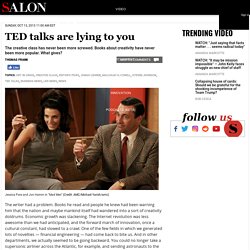
Books he read and people he knew had been warning him that the nation and maybe mankind itself had wandered into a sort of creativity doldrums. Economic growth was slackening. The Internet revolution was less awesome than we had anticipated, and the forward march of innovation, once a cultural constant, had slowed to a crawl. One of the few fields in which we generated lots of novelties — financial engineering — had come back to bite us. And in other departments, we actually seemed to be going backward.
The trouble with TED talks. I’ve long been amused by the slogan of TED, makers of the ubiquitous TED talks.
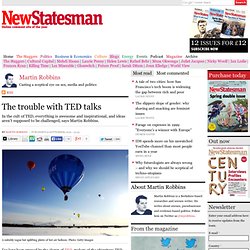
TED’s slogan is this: ‘Ideas worth spreading.’ Apparently TED has some ideas, and we should spread them. What ideas? Don't mention income inequality please, we're entrepreneurs - Media Criticism. There was a bit of a scandal last week when it was reported that a TED Talk on income equality had been censored.
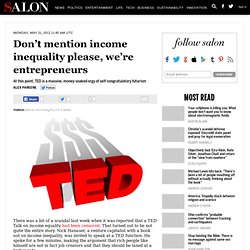
That turned out to be not quite the entire story. Nick Hanauer, a venture capitalist with a book out on income inequality, was invited to speak at a TED function. Lessons Worth Sharing.
T. John Hunter on the World Peace Game. Kathryn Schulz: On being wrong. Nina Tandon: Caring for engineered tissue. Harvey Fineberg: Are we ready for neo-evolution? Neil Pasricha: The 3 A's of awesome. Eric Berlow: How complexity leads to simplicity. Thomas Thwaites: How I built a toaster. Rebecca MacKinnon: Let's take back the Internet!
Mark Pagel: How language transformed humanity. Kevin Slavin: How algorithms shape our world. Sunni Brown: Doodlers, unite! Harald Haas: Wireless data from every light bulb. Alex Steffen: The shareable future of cities. Charles Hazlewood: Trusting the ensemble.
Svante Pääbo: DNA clues to our inner neanderthal. Julian Treasure: 5 ways to listen better. Tim Harford: Trial, error and the God complex. Rebecca MacKinnon: Let's take back the Internet! Misha Glenny: Hire the hackers! Philip Zimbardo: The demise of guys? Dan Ariely: Beware conflicts of interest. Marco Tempest: The magic of truth and lies (and iPods) Michael Pawlyn: Using nature's genius in architecture.
David Christian: Big history. Mick Ebeling: The invention that unlocked a locked-in artist. Jacqueline Novogratz: Inspiring a life of immersion. Barry Schwartz: Using our practical wisdom. Sasha Dichter: The Generosity Experiment. Raghava KK: Shake up your story. Kate Hartman: The art of wearable communication. Niall Ferguson: The 6 killer apps of prosperity. Lauren Zalaznick: The conscience of television. Miwa Matreyek's glorious visions. Andrew Bird's one-man orchestra of the imagination. Stefano Mancuso: The roots of plant intelligence. Kevin Slavin: How algorithms shape our world.
D.